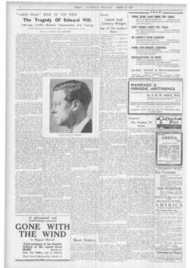Page 7, 19th March 1937
Page 7

Report an error
Noticed an error on this page?If you've noticed an error in this article please click here to report it.
Tags
Share
Related articles
THE LAW AND YOU—'VII
THE LAW OF COPYRIGHT
The whole of the law relating to copyright is now contained in the Copyright Act iii r which, being an Imperial Statute, is in force also throughout the Colonies and in the self-governing Dominions when adopted by the local legislatures.
Copyright means the exclusive right to produce or reproduce in any form copies of an original work or composition. The definition contained in the Copyright Act is, of course, much more detailed, and contains provisions dealing with the right to reproduce lectures, records and films and as to dramatising novels.
The scope of the Act is limited to original literary, dramatic, musical and artistic work, and applies, in the case of a published work, if the author was within the Colonies or Dominions when it was first published, and, in the case of an unpublished work, if the author was a British subject or resident within the Colonies or Dominions when he made the work.
Letters are Literary Works
Letters are neither dramatic, musical nor artistic works, but, strangely enough, every letter is a literary work. It has been held that a letter from a manufacturer offering goods at a certain price on conditions set out in the usual business jargon is at least literary enough for the Copyright Act to apply. As long as the letter exists the copyright in its contents belongs exclusively to the writer and not to the receiver. Usually the receiver has no authority to publish the letter, but this may occasionally be negatived as in the case of a letter to a newspaper which is clearly intended for publication. It is important to note that while the copyright belongs to the writer, the paper on which the letter is written is the receiver's property and he may destroy it at pleasure.
No Copyright in Ideas
Only original works are copyright. There is no copyright in ideas, and therefore to " crib " an idea from another book or to adopt the plot of a novel or play is not an offence against the copyright if the idea or plot is expressed by the adopter in an original form. The Copyright Act deals merely with the expression of thought, not with the originality of the thought.
Compilations and lists would, at first, appear to be outside the scope of copyright, but these may he original literary works if some skill and effort is necessary for their production. In fact the definition of literary work contained in the Act includes maps, charts, plans, tables and compilations. A dictionary or street directory is therefore within the Copyright Act and may not be reproduced, but there will be no copyright unless the compilation or list gives some useful information.
F.J.M.
[This series of articles began in our issue for August 7, 1936, and will continue fortnightly. Why not cut each one out and paste it in an exercise book ? You will then possess in time a complete compendium of the law as it affects you. The series is written by an expert lawyer.—EDITOR.]
blog comments powered by Disqus

















